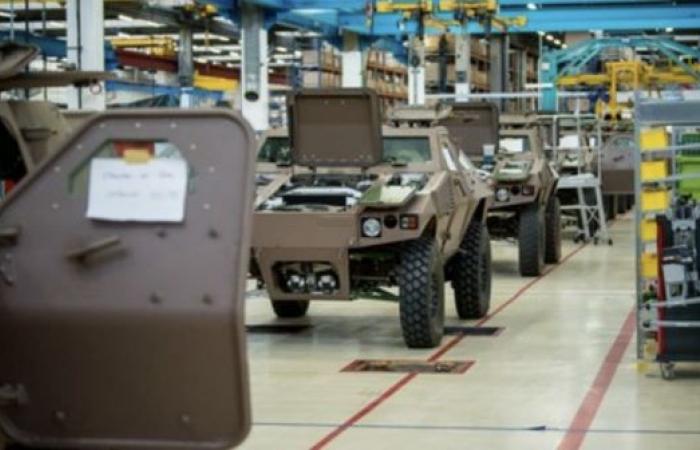Morocco is modifying its tax framework to encourage investment in the defense industry. A recent amendment to Decree No. 2.17.743 allows defense companies, including those producing equipment and weapons, to benefit from tax exemptions, thus stimulating investment and job creation.
As part of the implementation of its policy of support for industry and innovation, the government announced a series of measures aimed at encouraging investments in the industrial sector, particularly in the strategic area of defense industry. These initiatives were formalized by the 2017 finance law and a recent amendment to Decree No. 2.17.743, which specifies the conditions of tax exemption in favor of newly created industrial companies.
The government has introduced a total temporary exemption from corporate tax (IS) for newly created industrial companies. This exemption applies for the first 5 consecutive accounting years, from the date of the start of their operation. The objective is to stimulate investment in the industrial sector and promote job creation in this key area for the national economy.
This measure, included in the 2017 finance law, was clarified by Decree No. 2.17.743, which defines the list of industrial activities eligible for this tax advantage. Among the sectors concerned, we find in particular the automobile industry, metallurgy and the processing of raw materials. However, one key area, that of the defense industry, was initially only partially covered by these measures. Indeed, although the aforementioned decree includes the manufacturing of military vehicles, other critical sectors, such as the production of defense equipment and materials, as well as the manufacturing of weapons and ammunition, were not explicitly mentioned.
Faced with this situation and in order to strengthen Morocco’s competitiveness in this strategic sector, the government proposed to complete the annex to Decree No. 2.17.743. This modification aims to expressly include activities linked to the production of defense materials and equipment, as well as arms and ammunition, in the list of industrial activities benefiting from tax exemption.
This update allows companies specializing in the manufacturing of defense and security equipment, as well as in the production of weapons, to benefit from the same tax advantages as other industrial sectors. To do this, companies must hold a manufacturing authorization, as defined in Law No. 10.20 relating to defense and security equipment.
This initiative is part of Morocco’s broader strategy aimed at developing its defense industry, a sector considered essential for national sovereignty and regional security. The country aims to become a major player in the production and maintenance of military equipment, while attracting foreign investment and creating qualified jobs. In addition, this measure constitutes a strong signal to national and international investors, offering them an attractive tax framework to engage in long-term industrial projects. It also contributes to the diversification of the economy and the modernization of its industrial infrastructure.
The defense expert and professor of strategic studies at National Defense College of the United Arab Emirates, presented his views to “Maroc Diplomatique” on the challenges linked to defense in Morocco. According to Dr El Yattioui, it is clear that several actions have been taken in this direction. Among these is Bill 10-20, which has been in the works for some time. In addition, a decree was announced in June 2024, aiming to create what are called Economic Activity Zones (ZAE). The specialist underlines that “the objective is for the State to make land available to companies, both national and international, as well as legal, regulatory and tax facilities to facilitate their establishment. It will also be necessary to seek funding, identify international partners and develop research and development (R&D) initiatives to build a true Moroccan ecosystem in this sector.”
The definition of national security in Morocco must be continually strengthened, in response to constantly evolving issues in a complex and fragmented world. Equipment priorities concern acquisitions and future production intended to protect the kingdom’s borders, whether land, air or sea, on its Atlantic and Mediterranean coast. He states that “with potential threats, whether state or not, it is therefore crucial to have modern, quality equipment. It is also imperative to prioritize national security issues over the next 10, 20 and 30 years.”
Notable progress has already been made, notably with the signing of an agreement with the Indian company Tata Advanced Systems Limited (TASL) for the local production of the WhAP 8×8 ground combat vehicle in Morocco. Furthermore, a project relating to drones is also in development, this equipment being essential for Morocco, which wishes to integrate them into its defense strategy. Drones, not only very efficient, are also widely used by many countries. In this context, Morocco is continuing the modernization of its military capabilities with the acquisition, scheduled for February 2025, of Turkish Bayraktar Akıncı combat drones, manufactured by the Baykar company, after the purchase of 19 Bayraktar TB2 drones in 2021.
This legislative and regulatory development shows Morocco’s desire to adapt the tax framework to the specific needs of strategic sectors, while pursuing its objective of economic growth. By supporting the defense industry through tax incentives, Morocco is positioning itself as a regional hub in military technology and security, while consolidating its role as a key partner in industrial fields on a global scale.






